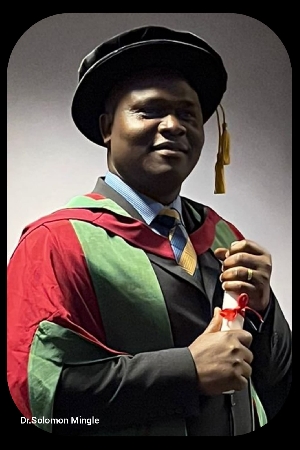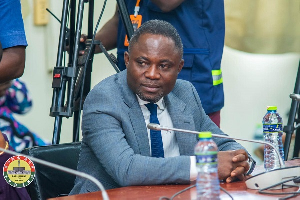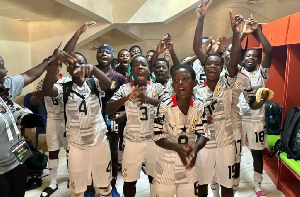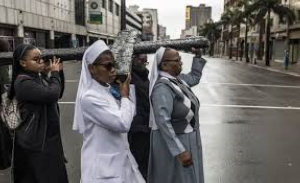Writers & Shakespeares Ghana Limited (writersghana.com) continues to engage Dr Solomon Mingle, the Leaky Wave Antenna scholar at University of Birmingham, UK, in order to explain his work to a wider audience.
Below is part two of the transcript of our interview conducted by Isaac Ato Mensah.
Writersghana.com/Isaac Ato Mensah: Dr Mingle, you indicated that the antenna must be raised above the ground at the appropriate height.
Could you please shed more light on how you attained that appropriate height, and the interferences that you encountered during your experimentation?
Dr Solomon Mingle: Alright. To explain this, I say that in the experimentation I determined the optimised height for the antenna which involved a combination of theoretical analysis and practical testing.
I used an electromagnetic simulation tool known as CST [Computer Simulation Technology] to model the antenna’s radiation patterns and then propagated the characteristics at various heights above ground.
This simulation allows me to identify the height that will maximise signal transmission and reception or signal received while minimising interference.
During the experiment, I encountered several interferences that affected the antenna performance.
These interferences include the environmental factors such as the structure, that is, where I was in the lab, the electrical equipment that were close to me and other wireless devices emitting electromagnetic signals within my environment.
Additionally atmospheric conditions and terrestrial features could also impact signal propagation and introduce interference.
However, the way I addressed this interference is that I implemented strategies such as frequency tuning, antenna adjustment, and shielding to reduce external electromagnetic noise.
These measures enhanced the antenna’s sensitivity to the desired signals.
Furthermore, I carefully used sight selections and precise positioning of the antenna which helped mitigate the effects of the environmental interferences which were around me and also ensured accuracy and reliable signal reception for the remote vital sign monitoring application.
Writersghana.com/Isaac Ato Mensah: Reading online, we see that this Leaky Wave antenna is not uncommon; it looks like the technology exists already.
But you are putting a special focus on the millimetre bandwidth.
Within what context should we place your findings given that other researchers are researching this subject matter in other parts of the world?
Dr Solomon Mingle: While it is true that Leaky Wave Antennas are not uncommon, my research focuses on the specific niche of this technology which is the millimetre wave band.
You know the millimetre wave band is a very, very short band. And it is free.
There is no licensing for it; it is a free band everybody can use and it is very short. Millimetre waves can penetrate through metals, can penetrate through wood, can penetrate through [cement] blocks, because the wave length is very, very short.
The narrowness of this allows me to address unique challenges.
That’s why I choose the millimetre wave, and it also gives the opportunities which I have associated with operating this frequency range.
Thus my choice enables me to achieve higher data transmission due to the shortness of the waves thereby making the transmission really, really fast.
And it also improves my spatial resolution and greater immunity to interference compared to lower frequency bands.
My findings about Leaky Wave Antennas worldwide contribute to the broader understanding of antenna design and optimization techniques particularly in the millimetre wave spectrum.
While some researchers may focus on different frequency bands or applications, my work adds to the collective knowledge base by offering insight and innovations that can benefit various fields such as health, telecommunications, security and other industrial applications.
Writersghana.com/Isaac Ato Mensah: We want to bring the technology home to Ghana.
Do you have any patents on what you have done so far?
Dr Solomon Mingle: I’m in the process of patenting this work, and as I said previously we are in stage three of the patenting process and I’m aiming to bring this technology to Ghana.
But you know, securing patents will also protect my intellectual property which is very, very important hence I need to get that one done straight first.
Once that is done, it will enable me to commercialise it, which will be beneficial to other local sectors and globally as well.
Writersghana.com/Isaac Ato Mensah: Are you working with any industry collaborators to make your technology available for wider use in the healthcare industry?
Dr Solomon Mingle: The answer is simply yes. I am actively collaborating with industry partners.
As I said previously the NHS [National Health Service of the UK] is number one.
We have 10 samples being tested. We’ve had 100 people being tested with this Leaky Wave Antenna.
And the whole idea for this is because you know when people go to hospital, there has to be a Nurse that comes around in the middle of the night to wake patients up [and check their vital signs].
So this Leaky Wave Antenna is a groundbreaking technology for the health sector because the remote monitoring can be done while the patient is asleep.
So it is really an advanced collaboration which I have already done with the NHS here in the UK. All patients have this remote monitoring on top of their beds and Nurses will stay in [their Nurses’] station and they can monitor the patient without waking them up.
Writersghana.com/Isaac Ato Mensah: Were you to get a call from Accra Technical University (formerly Accra Polytechnic), your alma mater, and they were to ask you to “come to Macedonia and help us” as the saying goes, what is the extent to which you can collaborate with them without breaking any agreement you have to share patent or copyright information with industry players whom we believe you may be collaborating with by now?
Dr Solomon Mingle: I value the opportunity to contribute to the academic opportunity. However, any collaboration with my alma mater [Accra Polytechnic] will need to be carefully coordinated to ensure compliance within any existing agreement regarding patent or copyright information that may involve industrial collaborators.
While I’m open to collaboration, I essentially uphold all legal obligations that protect intellectual property that comes with my research effort.
Writersghana.com/Isaac Ato Mensah: How was school work at Accra Polytechnic back in the day in terms of the practical input when you were reading Industrial Laboratory Technology for the Higher National Diploma?
Dr Solomon Mingle: As of that time [circa 1996-1999], Accra Polytechnic had its basic infrastructure which was really helpful.
So as a former student of Accra Polytechnic, now Accra Technical University, I recognise the importance of practical training in Industrial Laboratory Technology for the Higher National Diploma.
However, while the curriculum emphasises hands-on learning experience, there are limitations due to insufficient equipment.
These challenges can be fixed with proper infrastructure in place.
This will improve Accra Polytechnic in the near future.
Writersghana.com/Isaac Ato Mensah: Tell us about the frequency of having access to a laboratory for practical work; not just within your field but in terms of access to machine tools and the ability to build prototypes.
Having lived in the UK for some 20 odd years and having seen a lot, what is lacking in our technical universities?
Dr Solomon Mingle: To reiterate, my experience with laboratory access during my studies both in my field at Accra Polytechnic and across disciplines varied in experience and in depth.
While there were opportunities for practical work including access to machine tools and prototype building, the availability of resources was often limited at Accra Polytechnic.
In comparison to the UK, facilities are well advanced and available.
We have competent lecturers and technicians who will help you along the way to maximise your potential and bring out the best in you.
Also, there is a lot of funding for projects and research work in the UK as compared to that of Accra Polytechnic.
The UK is far advanced in research so I will not do that comparison at the moment.
[End of part two. Dr Solomon Mingle can be contacted through solomonmingle@gmail.com.]
Feedback: ato@writersghana.com; www.writersghana.com; LinkedIn, Isaac Ato Mensah; Instagram, @atomenswriters; Twitter, @Atomens; Facebook, Isaac Ato Mensah; Telegram, Isaac Ato Mensah; Quora, Isaac Ato Mensah; WhatsApp, (+233) 020 022 0353.
Writers & Shakespeares Ghana Limited exists to be a moral and intellectual guide to the best practice of PR and integrated communications around the world, beginning with Ghana.
Opinions of Wednesday, 10 April 2024
Columnist: Isaac Ato Mensah















